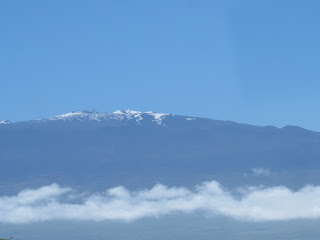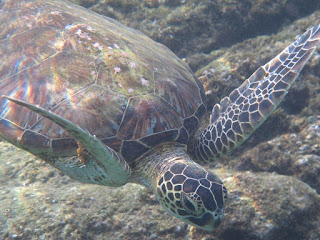The reef triggerfish is reminiscent of abstract art. We see them often, but they don't hang around long. Rather, they go swimming by. The Hawaiian name for this fish is humuhumu nukunuku apua'a. This is the fish that is mentioned in the "My Little Grass Shack" song from 50 or 60 years ago. They grow up to 10 inches long.
Tuesday, February 28, 2017
Saturday, February 25, 2017
A Bay, today
Anaeho'omalu Bay is often called A Bay. It is north of Kona along the South Kohala resort area. We had read about the bay, but never visited until today. The water was calm, but not really clear enough to be good for snorkeling, but lots of other water sports were happening there this morning.
In the distance, we could see humpback whales spy-hopping and breaching.
Today was a canoe club race day. The 6-person, outrigger canoes were zipping around the bay. Quite an interesting sight to see.
It seems like everywhere we go, we see wild turkeys. On our drive home from A Bay, we encountered 4, along the road.
In the distance, we could see humpback whales spy-hopping and breaching.
Today was a canoe club race day. The 6-person, outrigger canoes were zipping around the bay. Quite an interesting sight to see.
 |
| From shore |
 |
| From shore |
 |
| From the water |
 |
| From the water |
It seems like everywhere we go, we see wild turkeys. On our drive home from A Bay, we encountered 4, along the road.
 |
| A male turkey displaying to 2 females, plus another female left of mirror |
Friday, February 24, 2017
Oh the patterns you might see
Tropical fish are often brightly colored, but even the ones that aren't neon colored can display intricate patterns.
We frequently encounter black durgon (a triggerfish). Most often, it appears very dark with a white line beneath the dorsal and ventral fins. However, under just the right conditions, a very elaborate pattern of markings is displayed. Fish were 8 to 10 inches long.
Sailfin tang (in the surgeonfish family) also display a very interesting pattern. This fish was about 8 inches long.
We frequently encounter black durgon (a triggerfish). Most often, it appears very dark with a white line beneath the dorsal and ventral fins. However, under just the right conditions, a very elaborate pattern of markings is displayed. Fish were 8 to 10 inches long.
Sailfin tang (in the surgeonfish family) also display a very interesting pattern. This fish was about 8 inches long.
Tuesday, February 21, 2017
More butterflyfish
Here are two more gorgeous butterflyfish that we often see while snorkeling. The ornate butterflyfish has the more spectacular markings, but the longnose butterflyfish is also striking in appearance. Both use the same basic colors as the butterflyfish that appeared here a few weeks ago. And both species grow up to 8 inches long, but these were about 5 inches long.
Always a joy to see.
Always a joy to see.
 |
| Ornate butterflyfish |
 |
| Longnose butterflyfish. |
Monday, February 20, 2017
Just another day at the beach
Today the wind picked up, and waves were looking big, so we went to the beach to watch boogie boarders and surfers catch the waves.
The beach was Mannini'owali, not too far north of the airport. Really a pretty site, but not much shade or sand.
The 3 photos below show the progression of one man's ride of the same wave.
The beach was Mannini'owali, not too far north of the airport. Really a pretty site, but not much shade or sand.
The 3 photos below show the progression of one man's ride of the same wave.
Saturday, February 18, 2017
Fishing
After waiting for the right conditions, we headed out fishing this morning with Captain Jay in his boat Mariah. Although we started later than we expected, we were motoring out of the harbor before the sun rose above Mauna Loa.
On our first pass to the northwest, we saw one boat with a marlin on. After we circled around and headed SE, we saw a couple of humpback whales, and bait fish jumping out of the water. Shortly after passing the bait fish, we headed back towards the northwest, following the bait, and a mahi mahi hit one of the lines. That is what Bori really wanted to catch, so he was happy. It weighed about 20 pounds.
After the mahi mahi was iced down, the hooks went back in the water, and we headed back towards the marina (2 hours away). We saw a few more whales, and a while later, a blue marlin hit one of the lines. So, Bori had to reel that in. Originally, after seeing it jump out of the water, Jay estimated that the marlin was about 150 pounds. It turned out to be about 250. And it took off, so Bori had a lot of line to reel it. They tried to release it, but it didn't shake the hook out, so they landed it.
On our first pass to the northwest, we saw one boat with a marlin on. After we circled around and headed SE, we saw a couple of humpback whales, and bait fish jumping out of the water. Shortly after passing the bait fish, we headed back towards the northwest, following the bait, and a mahi mahi hit one of the lines. That is what Bori really wanted to catch, so he was happy. It weighed about 20 pounds.
After the mahi mahi was iced down, the hooks went back in the water, and we headed back towards the marina (2 hours away). We saw a few more whales, and a while later, a blue marlin hit one of the lines. So, Bori had to reel that in. Originally, after seeing it jump out of the water, Jay estimated that the marlin was about 150 pounds. It turned out to be about 250. And it took off, so Bori had a lot of line to reel it. They tried to release it, but it didn't shake the hook out, so they landed it.
Friday, February 17, 2017
A unicornfish
Several species of unicornfish live in the waters around Hawaii. Some have very long horns, others have short horns. This species, the orangespine unicornfish has no horn, but is quite lovely. We often see this species. It grows to about 18 inches.
This morning, we encountered an individual that was being cleaned by a Hawaiian cleaner wrasse. It was the first cleaner station that we have seen here. The wrasse (about 3 inches long) has a yellow head, and it's body changes from blue to purple towards the tail
This morning, we encountered an individual that was being cleaned by a Hawaiian cleaner wrasse. It was the first cleaner station that we have seen here. The wrasse (about 3 inches long) has a yellow head, and it's body changes from blue to purple towards the tail
Thursday, February 16, 2017
Birds of the Safeway parking lot
It's easy to feel like you aren't back home when you encounter odd birds, while at the grocery store. By now, I've grown accustomed to seeing the chickens and roosters.
But today, we encountered a female Kalij pheasant. This species is native to India and Pakistan, and was introduced to Hawaii in 1962.
But today, we encountered a female Kalij pheasant. This species is native to India and Pakistan, and was introduced to Hawaii in 1962.
Tuesday, February 14, 2017
Heading north
This morning, we opted to head to the northern end of the island. The topography is quite varied up there, and our route was a giant loop so each mile looked different.
Our first stop was just south the deep-water port at Kawaihae, at Spencer Beach Park, and the Pu'ukohola Heiau above it, built by Kamehameha the Great. This temple was one of the last sacred structures built in Hawaii (1790-91) before contact with western civilizations altered local culture.
We followed the north Kohala coast up to Hawi and Kapa'au in the north, to find the old statue of Kamehameha the Great, built in 1880.
Then we followed the Kohala Mountain road to Waimea. The temperature dropped as we climbed to over 3500 feet. And the hills became quite green and lush looking pasture land. Lots of cattle are raised around Waimea.
We were able to get a clear view of the top of Mauna Kea, with several of the observatories visible above the snow.
Happy Valentine's Day!
Our first stop was just south the deep-water port at Kawaihae, at Spencer Beach Park, and the Pu'ukohola Heiau above it, built by Kamehameha the Great. This temple was one of the last sacred structures built in Hawaii (1790-91) before contact with western civilizations altered local culture.
 |
| Spencer Beach Park |
 |
| Pu'ukohola Heiau, built to insure that Kamehameha would conquer all the Hawaiian islands |
We followed the north Kohala coast up to Hawi and Kapa'au in the north, to find the old statue of Kamehameha the Great, built in 1880.
Then we followed the Kohala Mountain road to Waimea. The temperature dropped as we climbed to over 3500 feet. And the hills became quite green and lush looking pasture land. Lots of cattle are raised around Waimea.
 |
| Looking southwest from the Kohala mountain road |
We were able to get a clear view of the top of Mauna Kea, with several of the observatories visible above the snow.
Happy Valentine's Day!
Saturday, February 11, 2017
Swimming with green turtles
We often encounter green turtles as we snorkel. We always enjoy seeing them, but we respect them, and never touch them. Here are a few of our favorite photos of a couple of green turtles.
 |
| We found their secret napping spot, beneath a small coral head |
 |
| On another day, the same spot, but a different (smaller) turtle |
Tuesday, February 7, 2017
Visiting the Volcano
This morning, we drove over to Hawaii Volcanoes National Park. We left early, and arrived at the visitor center shortly before it opened. The weather was dry and fairly clear in the park, and we learned that the lava lake inside the Kilauea Caldera was erupting.
So we headed to the viewpoint behind the Jaggar Museum and looked into the Halema'uma'u Crater which is inside the Kilauea Caldera.
The first video is a view of the crater. The second is the erupting lava lake.
Nice way to spend the day!
So we headed to the viewpoint behind the Jaggar Museum and looked into the Halema'uma'u Crater which is inside the Kilauea Caldera.
The first video is a view of the crater. The second is the erupting lava lake.
Nice way to spend the day!
Sunday, February 5, 2017
Another day in the water
This morning, we headed to our favorite local snorkel site ahead of the crowd and before the big surge that is predicted for the next few days. We encountered a lot of current, but were still able to enjoy the marine life.
Today's photos represent one unusual-looking fish species, the bird wrasse, and one invertebrate, an octopus.
The bird wrasse uses its long snout to feed on small benthic prey.
Today's photos represent one unusual-looking fish species, the bird wrasse, and one invertebrate, an octopus.
 |
| Octopus |
 |
| Octopus out in the open |
 |
| A small female bird wrasse (about 4 inches) |
 |
| A male bird wrasse (about 8 inches long) |
The bird wrasse uses its long snout to feed on small benthic prey.
Subscribe to:
Comments (Atom)




































